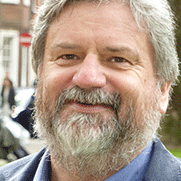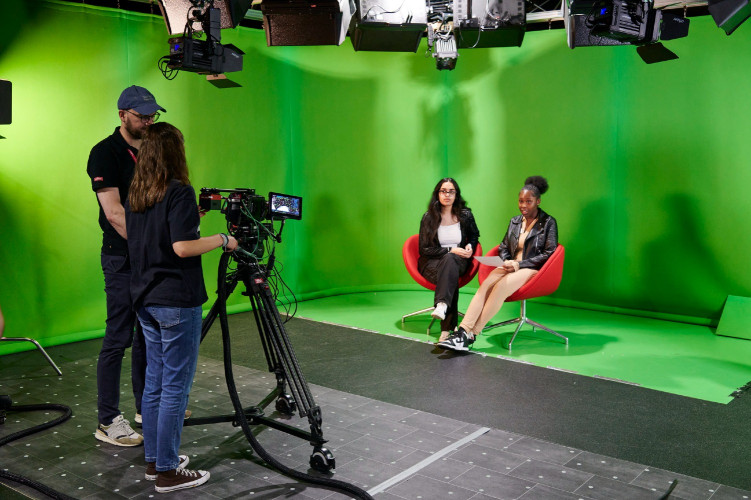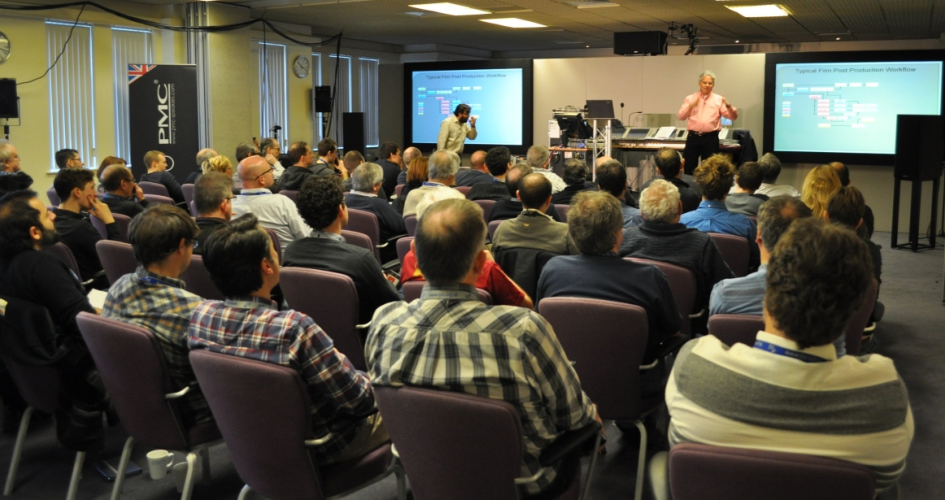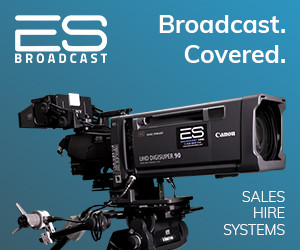by Dick Hobbs Issue 86 - February 2014 At the end of January a new body the Institute for Training in Television Production (ITTP) held its first conference, organised by the publishers of TV-Bay magazine and chaired by former broadcaster Roz Morris, MD of TV News London Ltd. A packed room debated sometimes hotly the issues.
Chair of ITTP is freelance lighting cameraman Graham Reed. In his opening comments he painted a bleak picture of the skills that the current crop of media technology courses are teaching. He recalled a recent lighting job on which he gave experience to a couple of third-year students.
I asked them the 13A question: what current can you draw from a domestic circuit, he recalled. I asked them about amps, and got the distinct impression that they had no idea. Their ideas of wiring up a 13A plug made me very scared.
Young people want to direct music videos, but they have no idea of counting bars or musical notation. Students do not seem to know anything about logarithms, even though we see and hear in log scales. How did this happen?
If they are lacking in core technical skills, he also felt that they were missing the artistic sensibilities, too. If I ask camera students who their favourite artist or photographer is, they look at me blankly, he said.
Appropriately, then, the first session focused on skills that employers need. Both Chris Owen, head of cameras at ITV, and Douglas Fletcher, operations director at CTV said they did take new graduates, but they saw them very much as trainees who need considerable further work before they can be useful to their new employers.
They emphasised the need for students to be self starters, too. Owen said that he received applicants from students who had identified studio multi-camera operations as their future, who had never been inside a studio. We have 3000 people a week as audiences in The London Studios why have they not done that. This is something I criticise the universities for.
To help, ITV Studios runs a six week summer placement scheme, giving them two weeks with cameras, sound and lighting. They typically get 200 300 applications for around 12 places. At CTV Fletcher recruits around nine students a year from around 120 applications, for those who want to work in outside broadcasts. This is expensive for us, he said. We cant send them out as engineers, and we get no money from our clients for them.
Peter Leverick, now running the New Leaf Academy as an alternative training route for camera operators, raised another issue, that having the individual skills is not enough. They need to know about teamwork, and they need to know how to deal with performers, in a diplomatic but positive way.
The university approach
Perhaps the central argument of the day was the role of universities in training. With a lot of heads of department from the more active universities in the room there was, unsurprisingly, a lot of enthusiasm for degree courses.
But on the other hand, many voices who would perhaps accept the description old school professionals wanted to see much more vocational training. Peter Leverick felt that a three year degree course is too long. Students want to come away with a piece of paper that says I have a degree, he felt. Better would be a one year foundation course which looks at the theory, and gives them the chance to decide which discipline they are going to follow, with a day release programme to take new entrants into the business to do modular courses at colleges.
One comment from the floor argued that universities were too academic. That was countered with another voice, pointing out that Buckinghamshire University has its own outside broadcast unit that covers every Watford home game as well as music and dance events.
Ralph Tribe from Sky said we have come out very firmly in favour of apprenticeships and vocational training. If the debate is about employability, we think apprenticeships are the best solution.
If you consider content as an industry, it is really in a resurgent phase. For us, it is about competing in a market where there are not enough skills to go around. That is a pretty exciting place to be.
One of the most interesting aspects of the day was that the technical operations were provided by Kingston University, and many of the student crew joined in the debate. By the end of the day it was clear that there was no resolution to this debate, which will run and run.
Accreditation
A second major strand to the debate was the value of Creative Skillset and its accreditation of some degree courses. Indeed, there was considerable debate about the nature of Creative Skillset, even before we got to its contribution to the debate. To be clear, Creative Skillset is an independent UK organisation owned and managed by the creative industries. Its role is to identify and tackle the skills and productivity needs of these industries throughout the UK. That means it is active in film, television, radio, animation, visual effects, games, fashion, textiles, publishing, advertising and marketing communications. Perhaps its most visible role in television training at the moment is in accrediting courses at universities. According to Dinah Caine, the Creative Skillset CEO, the body has moved away from recognising institutions as a whole to accrediting individual courses. Out of the 4000 courses which are relevant to the creative industries, we have accredited 166, of which 68 are relevant to television.
A comment from the floor from a university which had attained accreditation was that achieving it is bloody tough, because it is evidence-based. One of the factors that is tracked is the success rate of getting jobs in the industry, so it takes time. Victor Glynn, now a freelance producer, is one of the evaluators which Skillset calls upon to look at courses. We go out as a team to talk to course leaders and to students, to give our input on what we think would be valuable to an employer, he said.
Creative Skillset is not the only body offering accreditation. The technical body BKSTS also offers the service, and at present its mark has been awarded to 18 graduate and post-graduate courses.
There is an intrinsic value of an external control for accreditation, said BKSTSs Mark Trompeteler. But increasingly we are of the opinion that the value is in the relationship between the accreditors and the students and college, which should last far longer than the simple accreditation. We continue to work with student councils to maintain the strength of the course and the relationship.
For Creative Skillset, Victor Glynn also emphasised that it was not an evaluation and either a tick or not. As part of the Skillset tick you get a local consultative board of the great and the good in the area, he said. They are a huge resource in providing contacts and opening doors.
For both bodies, though, their accreditation programme is aimed at academic institutions. Christine Blundell and Peter Agbaba have founded a craft skills training centre, for hair and make-up. They argued fluently that there is no formal structure in the industry any more, so there is no defined path. We are looking at some sort of evaluation scheme, and we have looked at Skillset for accreditation but they are not currently interested. In effect, we are self-certificating.
Ultimately, the value of accreditation at present is seen as a guide to the better courses, the academic programmes that have some value to the world of work. Dinah Caine said I think it is incredibly important that students get signposted into courses that will be relevant to future employment. Creative Skillset accreditation is now a part of formal student information packs. Anne Morrison of BBC Academy made the point even more starkly: I feel very sorry for some people who have spent £9000 a year for three years on a degree that is not worth very much. We have to be involved in universities and accreditation.
By the industry
While the old days of everyone in the industry going through Wood Norton at some stage in their career have long gone, Morrison was keen to emphasise that the BBC is still the industry trainer. We delivered something like 50,000 days of training last year, and our websites are open access to people outside the BBC, she said. The philosophy of the BBC Academy is to share our knowledge with the wider industry because we are all dependent upon a mobile workforce.
The point was also made that work experience can help to bridge the expectations gap between students at university and employers. As Doug Fletcher of CTV said, a 30 camera outside broadcast is a big eye opener for students.
For the BBC, Anne Morrison said we have about 1500 people a year come in on work experience. This is limited to four weeks. Work experience can be abused, and we are leading the way in stamping this out. Creative Skillset has brought out a set of guidelines on the law and work experience.
The conference heard that Sunset + Vine has taken on a group of apprentices for its 2014 Commonwealth Games coverage. But while work experience was seen as an important part of the process, but the point was also made that the tools today are so inexpensive that cost is rarely a barrier.
David G Croft, one of our most successful light entertainment directors and now a lecturer at the National Film and Television School, said You want to be a director make some films! Film your mum making breakfast and work up. If you want to be successful in the television industry they you have to go for it.
The delegates were uniformly grateful for the day and the chance to at least open the debate, but it is clear there is still much to do in opening up the lines of communication. We need further clarification in what the industry wants and what universities and other training bodies can deliver.
As a delegate said in the final session, the universities have been talking about accreditation of their courses; the industry has been talking about personal credentials. The course has to deliver what the student wants, but when it comes to working in the industry, the validation comes from your peers. You need to be recognised by the industry itself.
That industry remains an exciting and a vibrant place to be. And, as chairman Graham Reed said, by improving training we can improve the profitability of the British television industry. This conference is about making it happen.






























